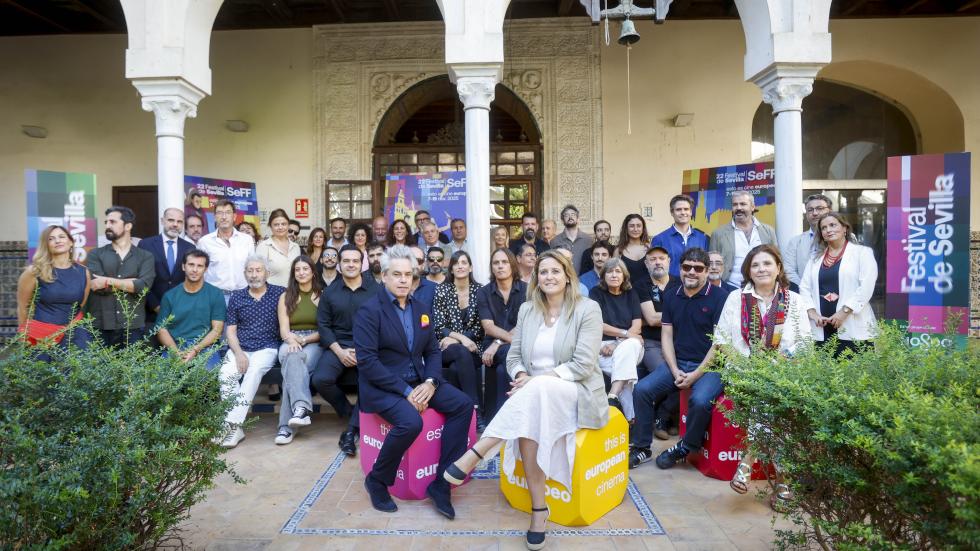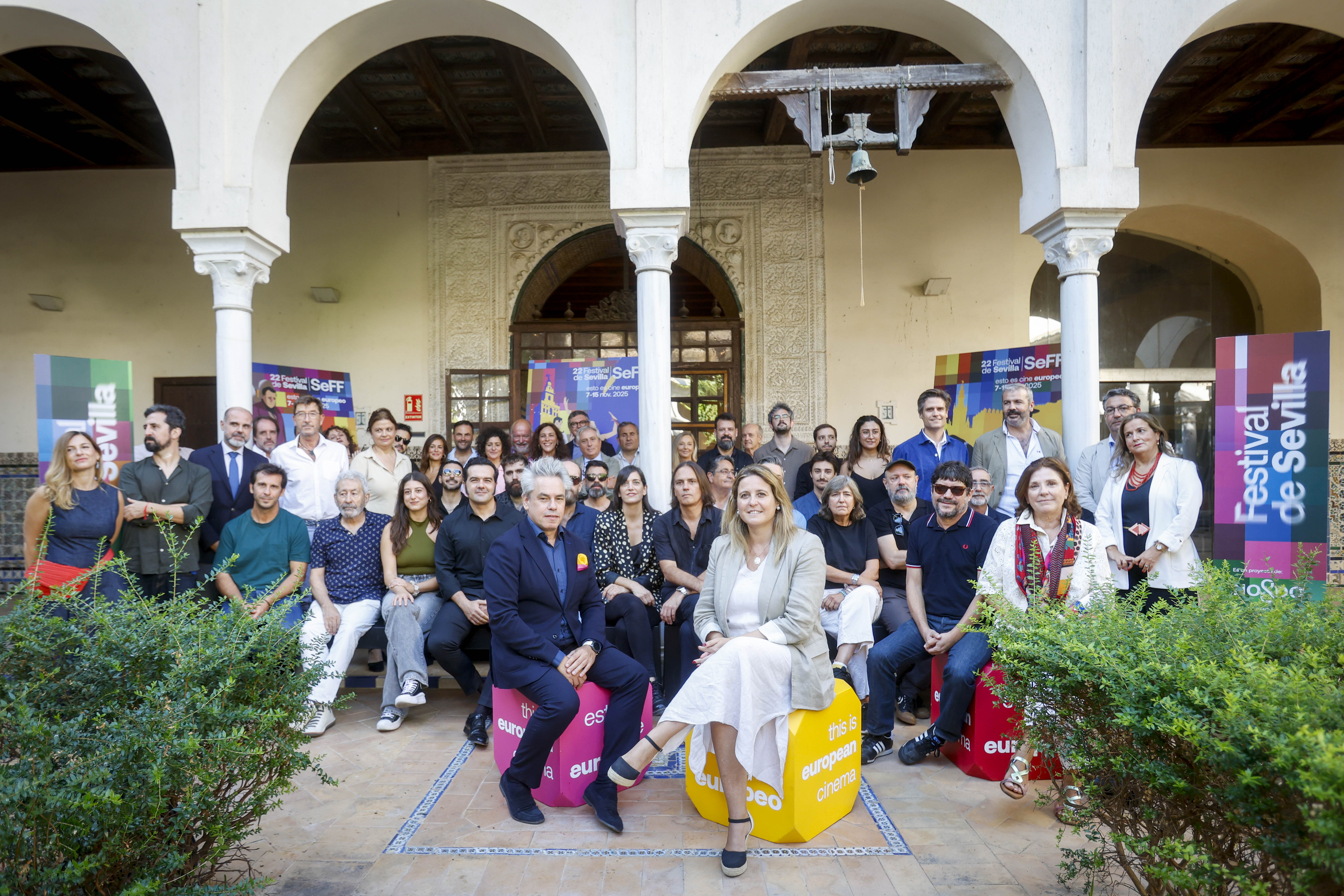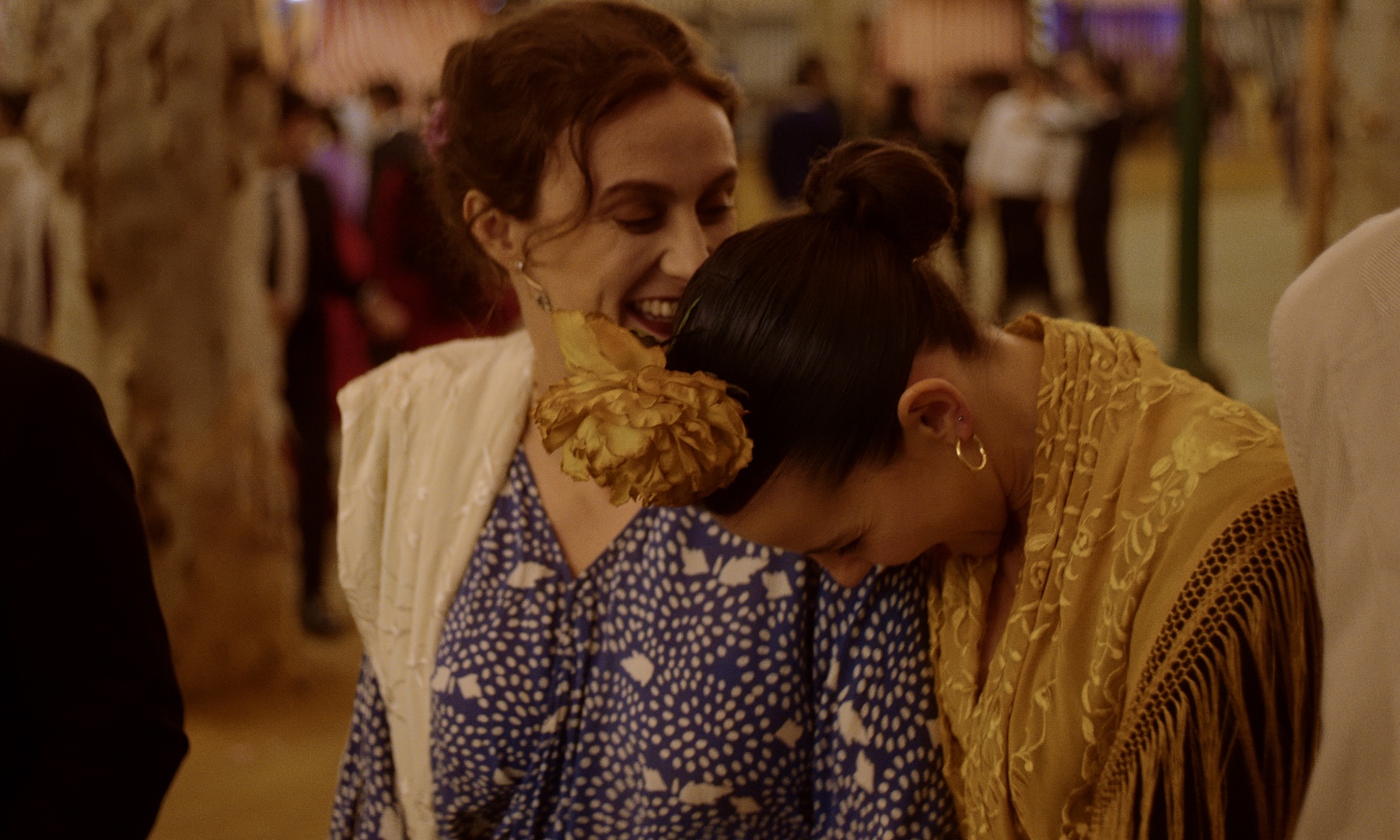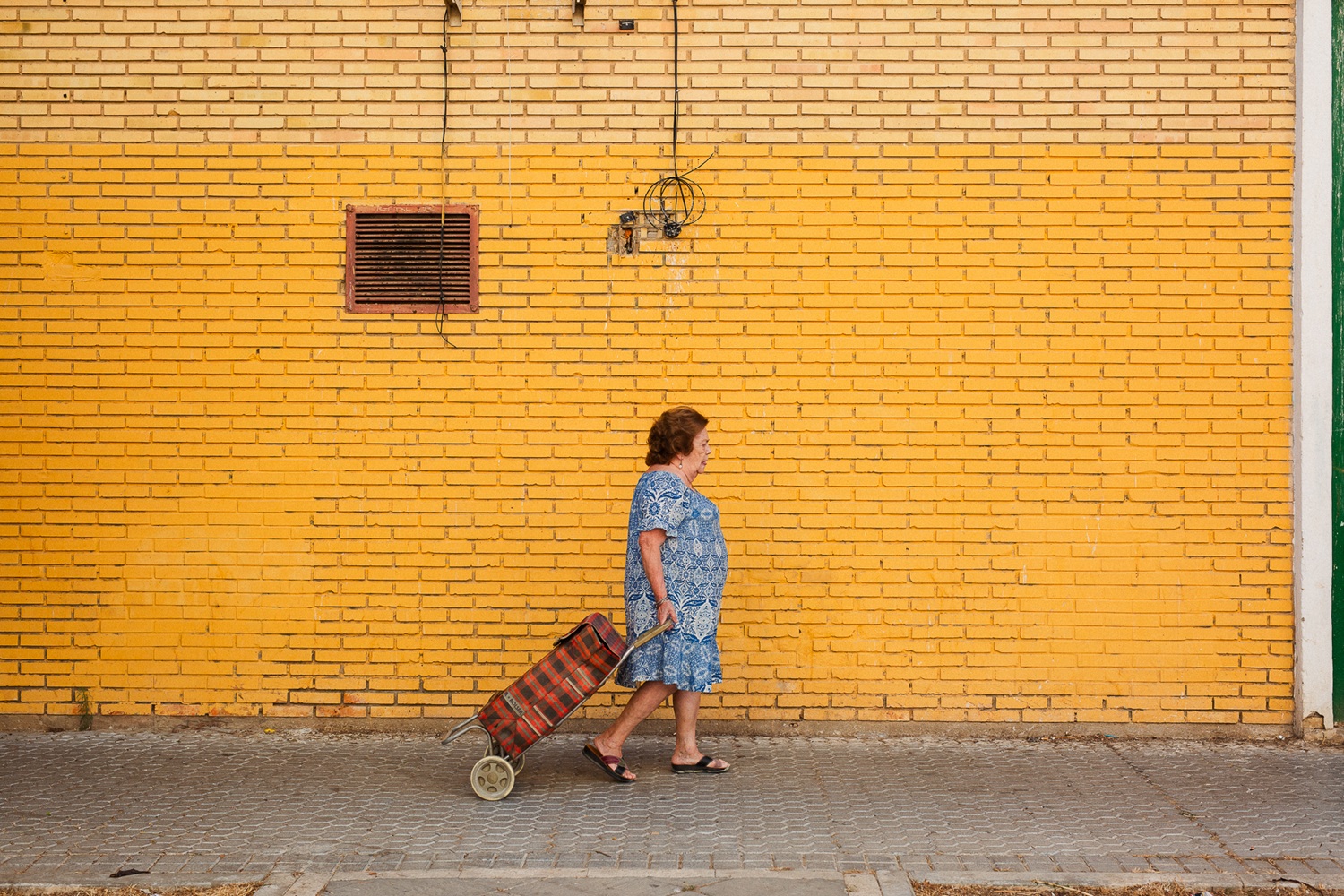
This morning, Seville’s Espacio Santa Clara hosted the presentation of the Andalusian films that will be screened across the different sections of the Seville European Film Festival. The event featured the participation of Angie Moreno, Councilor for Tourism and Culture of the City of Seville, and festival director Manuel Cristóbal, alongside a wide representation of the filmmakers involved.
“The 22nd Seville European Film Festival is, above all, a tribute to creativity and diversity. And in this edition, that diversity carries a very special hallmark: Andalusian cinema, which becomes one of the festival’s main protagonists,” said Angie Moreno during the presentation. “Nearly 50 titles span the entire program, with two national premieres and thirteen world premieres. From the Official Section to Panorama Andaluz, and including Embrujo and Special Screenings, the Andalusian voice resonates strongly in every screening,” the Councilor added.
Andalusian cinema runs throughout the program, bringing audiences—through both fiction and documentary—stories from the South, told from the South. “For the Seville Festival, it is both a commitment and a joy to continue giving visibility to Andalusian cinema, reflecting the richness of a body of work that embraces every register: from memory and identity to humor or the boldest experimentation. That plurality is its best calling card,” added festival director Manuel Cristóbal.

Andalusian Talent in the Official Section and Embrujo
In the Official Competition of the Festival, the Cádiz-based production company Playa Chica presents, in its Spanish premiere after screening in Karlovy Vary, the feature film La Anatomía de los Caballos (The Anatomy of Horses), directed by Peruvian filmmaker Daniel Vidal Toche and co-written with producer Ignacio Vuelta. This story takes us to the Andes to question whether revolutions ever lead to real change, and why the desire to fight and transform so often ends in failure.
For the first time, short films—traditionally a space of creative freedom and a natural springboard for new voices—will take center stage in the Festival’s Official Section. Two Andalusian shorts will have their world premieres in competition alongside other European productions: Hermanas, written and directed by Setefilla González Naranjo and Javier Barbero Montes (Carmen Award 2023 for Best Documentary Short with Nos acompañamos), and Baile de Feria, written and directed by Bernabé Bulnes (ASECAN Award for Best New Director in 2023). Both are family-centered stories that move through the languages of tenderness, memory, and care, offering a profoundly human portrait of Seville.
The Festival’s Embrujo section, dedicated to the boldest and most innovative cinema, will host the Spanish premiere of Quién Vio los Templos Caer (Who Saw the Temples Fall), the feature debut of Granada-born filmmaker Lucía Selva. A hybrid documentary co-written with Joan López Alonso, the film explores Granada’s cultural ruins while addressing the pressures of overtourism and the erosion of heritage and identity.

Eight Andalusian Productions in Special Screenings
Among the festival’s Special Screenings—reserved for standout European works recognized for their artistic impact, quality, or cultural relevance—eight Andalusian films, seven documentaries and one fiction feature, take the spotlight.
In the documentary field, Remedios Malvárez and Arturo Andújar present Fandango, winner of the 2024 Carmen Award for Best Documentary. This musical road movie captures the soulful essence of Huelva, written by Malvárez with Miguel Ángel Parra.
Sevillian director Alfonso Sánchez, with a screenplay by Eva Montoya, unveils Pendaripen, shedding light on the untold history of the Roma people.
Lorca en la Habana, directed and written by José Antonio Torres and Antonio Manuel, explores the mark that the poet Federico García Lorca left on Cuba—and the impact the island had on him.
With Velintonia 3, director Javier Vila (co-written with Leticia Salvago) rescues the collective memory still inhabiting the home of Nobel laureate and Sevillian poet Vicente Aleixandre.
In a similar spirit, Luis Gordillo. Manual de Instrucciones, directed by Sema D’Acosta and Antonio García Jiménez, revisits the life and work of another illustrious Sevillian, one of Spain’s most influential contemporary artists.
Francisco Campos directs El Gigante Mudo, reclaiming Spain’s historical legacy in Mexico, while La Muralla de los Prisioneros, written and directed by José Luis Tirado, recalls the construction of the Strait Wall by prisoners of war during Spain’s postwar era.
Finally, rounding out the strong Andalusian presence in Special Screenings, La Casa en el Árbol, the only Andalusian fiction feature in this section, will premiere in Seville. Directed and written by Sevillian filmmaker Luis Calderón, of La Barbería Films, it brings an auteur’s vision to the slasher genre.

Highlights of Southern Cinema in Panorama Andaluz
Four fiction features and ten documentaries make up this year’s Panorama Andaluz, reflecting the diversity of voices shaping the audiovisual landscape of Andalusia.
Written and directed by Seville-born Santi Amodeo, and based on the stories of American writer David James Poissant, El Cielo de los Animales (The Sky of Animals) is a collection of tales about loss, starring Raúl Arévalo, Manolo Solo, and Jesús Carroza.
Tras el verano (After the Summer), directed by Yolanda Centeno and co-written with Jesús Luque, explores the emotional complexities of separation, with Juan Diego Botto, Alexandra Jiménez, and Ruth Gabriel leading the cast.
In Rabioso (Rabid), Patricia Ross, José Luis García-Pérez, Víctor Clavijo, and Eva Almaya star in an action thriller with shades of a contemporary western, written and directed by Luis María Ferrández.
Roberto Jiménez’s La Tierra de Amira (Amira’s Land), co-written with Pedro García Ríos and Rodrigo Martín, delves into cross-cultural bonds, featuring Mina El Hammani, Pilar Gómez, Manuel Morón, and Joaquín Núñez.
Among the documentaries, actress and filmmaker Sara Sálamo directs En Silencio (In Silence), an intimate portrait of Betis footballer Isco Alarcón and his private struggle against the injury that forced him from the field.
Produced by Fernando Franco, Una Película de Miedo (A Scary Movie), directed by Sergio Oksman, follows the filmmaker and his son during a summer stay in an abandoned hotel in Lisbon, eerily reminiscent of The Shining.
Debut director Reyes Gallegos presents Ellas en la Ciudad (Women in the City), co-written with Rafael Cobos, a documentary that highlights Seville’s peripheral neighborhoods through the voices of grandmothers and mothers—the city’s enduring soul.
La Marisma, directed and co-written by Manu Trillo, contemplates the natural and human landscapes of the Bajo Guadalquivir as a space of reflection amid a changing world.
Paco Ortiz’s Antonio, El Bailarín de España reconstructs the life of legendary Sevillian dancer and choreographer Antonio Ruiz Soler through archives and never-before-seen footage.
Tiempo entre Olivos (Time Among Olive Trees), directed by Jaén-born Fany de la Chica, is a visual metaphor for the passage of time, the loss of traditions, and the decline of Andalusia’s rural world.
Plaza Nueva a las Diez, directed by Carmen Tortosa, shows how life continues to pulse at 60, a testament to the power of art and the resilience of the human spirit.
Veteran director Moisés Salama, with a script co-written by Miguel Ángel Oeste, presents No Sea Tu Falta (Don’t Let It Be Your Fault), an intimate autobiographical documentary reflecting on memory, roots, and identity at the age of 70.
The section also features Los Pinceles de la Baronesa (The Baroness’s Paintbrushes), by Julio Muñoz Gijón and Mauricio Angulo, and Sueños Flamencos (Flamenco Dreams), a biographical documentary by Sevillian filmmaker Juanma Suárez.

Small but Powerful Stories: 22 Shorts in Panorama Andaluz
The short film, a space for creative freedom and a natural laboratory for new voices, features prominently in Panorama Andaluz with 22 works that display the richness and diversity of Andalusian storytelling. “Short films are a territory of creative freedom, and the Andalusian panorama proves year after year that our filmmakers approach it with talent and ambition. In Seville, we want to be the natural home for these new voices,” said festival director Manuel Cristóbal.
The lineup includes titles such as La Sangre by Joaquín León, Discordia by Álvaro Amate, Romance de la luna, luna by Jimena R. Herrera, Quejío de loba by Andrea Ganfornina, Desenterrar un rosal by Bruno Ojeda, Allí, lejos de aquí by Pedro Gondi, Las desqueridas by Gonzalo Ruiz and Charlie García Villalba, Acción, figuración by Pablo Cueto, Relax by José Luis Maldonado, One-Way Cycle by Alicia Núñez Puerto, Jueves de marzo by Luis Murillo Arias, All You Need is Love by Dany Ruz, Fuera del agua by Aly Fresno, El lado más bestia de la vida by José Antonio Campos Aguilera, La cura by Rosendo M. Diezma, El Amoragaor by Adrián Ordóñez, Ei, Temi by Jesús Minchón Rodicio, De Madrid al Cielo by Pablo Pérez, Lo que Desaparece by Nono Ayuso and Rodrigo Inad, ¿Quién Mató a la Cucaracha? by Juan Escribano Tamayo, Gilbert by Arturo Lacal, Alex Salu, and Jordi Jiménez, and Happy Hour by Nico Romero and Álvaro Monje. Together, they confirm the wealth and plurality of contemporary Andalusian short filmmaking.
Cinema and Geopolitics: The Seventh Art Confronts the World’s Greatest Challenges
The Seville European Film Festival launches this year the Cinema and Geopolitics sessions, to be held from Monday, November 10, to Thursday, November 13, at the Cartuja Center CITE. Conceived as a space for analysis and debate, these sessions explore global and European challenges through a cinematic lens, with the participation of experts from various disciplines—especially from Seville’s universities.
The program will include screenings of four films—two in competition and two classics—such as Costa-Gavras’ Z (Monday, November 10), which will open a debate on attacks against democracy and the international order, and Stanley Kubrick’s Dr. Strangelove or: How I Learned to Stop Worrying and Love the Bomb (Wednesday, November 12), sparking dialogue on nuclear threats and the new world order.
The sessions, directed by Jorge Quindimil, Professor of Public International Law and International Relations at the University of A Coruña, will feature leading professionals and academics, especially from the Universidad Pablo de Olavide, the University of Seville, and the Universidad CEU Fernando III in Seville.






